As the 2023 school year begins, the Georgetown School of Foreign Service is excited to welcome 13 new faculty members to our community: Ekin Birol, Melinda González, Mary Hallward-Driemeier, Nader Hashemi, Adam P. Liff, Jonathan Lincoln, Emily Matson, Kamaludeen Mohamed Nasir, Vanessa Watters Opalo, Jackson Perry, Christi Smith, Titilola Halimat Somotan, and Yuri Zhukov. Whether serving in new roles or encountering the Hilltop for the first time, these faculty enrich SFS with their wealth of academic and professional experience.
Ekin Birol
Associate Professor of the Practice of Development
Director, Graduate Certificate in Social Innovation and Global Development
Global Human Development Program
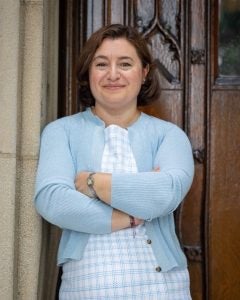
For the past two years, Ekin Birol has served as an adjunct professor, Capstone advisor, and mentor at the Global Social Innovation Lab; this year, she joins SFS as an associate professor of the practice of development. In this position, Birol takes on the role of director of the graduate certificate in social innovation and global development, and will also oversee the Capstone project and DC internship processes for the Global Human Development (GHD) program. Before her time at SFS, Birol worked extensively at global research partnership CGIAR, offering expertise on technological and policy solutions to address malnutrition, poverty, resource degradation, climate change and social exclusion. In her academic career, she has published more than 60 peer-reviewed journal articles, primarily in the fields of economic development, agriculture, health, climate change and the environment.
Prior to SFS, Birol’s work at the CGIAR and the World Resources Institute took her around the world in transdisciplinary teams to tackle the biggest problems in development.
“Through my research—most of which was applied—I had the opportunity of doing fieldwork and spending extended amounts of time in several regions of the world, from Mekong Delta to East Africa; from South Asia to Central America; from eastern and southern Europe to West Africa,” Birol says. “Throughout my professional career I got to work not only on research components of development projects, but also on other areas ranging from resource mobilization to program design; monitoring, evaluation and learning communication and advocacy. I believe all of these experiences have prepared me to become an effective professor of the practice of development.”
In her time as a capstone advisor and mentor, Birol gained a deep knowledge of the GHD program, as well as the people who make the program what it is. “Through these interactions—which were over and above my teaching duties as an adjunct professor—I got to learn more about the depth and breadth of the GHD program, and the linkages between its various requirements,” Birol says. “I believe being involved across the various components and requirements of the GHD program gave me a much clearer picture of the students’ interests, strengths and needs, which has and will continue to inform my teaching, advising and mentorship roles.”
When asked what brought her to SFS, Birol’s answer is simple: the students. “Each and every one of them is a marvel, so unique in their strengths, interests, passions and lived experiences, and each has so much potential to change the world for the better. I cannot wait to support them during (and even after) their journeys at SFS,” she says.
Melinda González
Assistant Professor and Provost’s Distinguished Faculty Fellow, Culture and Politics
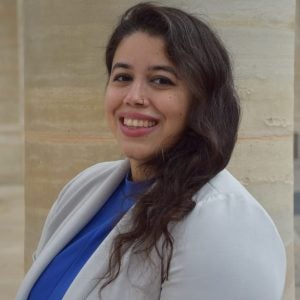
Arriving at SFS from a post-doctoral fellowship at the Institute for the Study of Global Racial Justice at Rutgers University, Melinda González is a socio-cultural anthropologist with a focus on environmental anthropology and disaster studies. Her work examines the distribution of disaster impacts at the intersections of race, class and gender, and she uses decolonial and indigenous research methods in her studies. Her upcoming book manuscript considers long-term disaster recovery strategies—including the use of digital space, poetry and community organizing—employed by survivors of Hurricane Maria in Puerto Rico and New York. Alongside her academic research and writing, González is a spoken word artist and published poet.
“As a scholar, poet, and children’s book author, I hope to bring an array of experiences and pedagogical approaches to my research and future teaching at SFS,” González says. In addition to her writing, González’s research has taken her around the world, including Asia, Central America, Polynesia and the Caribbean.
Outside of SFS, González lends her expertise to several organizations.
“I have decades of experience as a mentor and have served as a board member for an anthropological association. Currently, I am a global consultant on gender for the United Nations Office for Disaster Risk Reduction and have been the co-chair for the Anthropology and Mental Health Interest Group (AMHIG) for the Society of Medical Anthropology for the past few years,” she says.
Mary Hallward-Driemeier
Professor of the Practice of International Economics
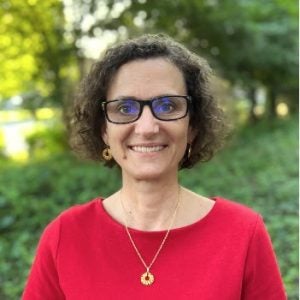
Mary Hallward-Driemeier comes to SFS with over 25 years of experience at the World Bank, where she worked in the research department and led the Bank’s analytical teams on productivity, jobs, innovation, trade and private sector development. During her career, Hallward-Driemeier worked in over 50 countries, served as senior economic adviser to three vice presidents and two World Bank chief economists, represented the World Bank in G20 Working Groups and led the “Jobs & Economic Transformation Special Theme” for
the International Development Association. Her recent publications include “At Your Service?: The Promise of Services-Led Development,” which evaluates the possibility of less industrialized countries favoring services rather than export-led manufacturing in their development, and “Europe 4.0: Addressing the Digital Dilemma,” which lays out a plan for Europe to create a more inclusive and robust digital economy.
“I started my career during the East Asian financial crisis, working on the five crisis countries. Helping countries respond to COVID and all the accompanying disruptions filled the last few years. Responding to crises brings out the best in the institution and staff; people care about making a difference, particularly when and where it is needed most,” she says. “I see the difference that evidence can make in guiding decisions, as well as the need to have practical insights into how to move projects forward. Being able to listen and appreciate the challenges from others’ perspectives helps build trust and teams that work effectively together. Being able to help prepare more people for careers that can contribute to making the world a better place is what has drawn me to Georgetown, and to SFS in particular.”
“I almost took an academic post when I first graduated from MIT, so academia has always had a strong pull,” she says. “I have taught both at MIT and at [Johns Hopkins] SAIS, so teaching and engaging with students is something I find very motivating. I love the energy, enthusiasm and commitment of Georgetown students.”
Coming to SFS, Hallward-Driemeier stressed the opportunity to see the problems she’s been working on throughout her career in a new light. “The interdisciplinary approach of SFS is a real strength. Economists can abstract away from some of the complex realities of policy making. And political scientists do not always have the tools to do rigorous hypothesis testing. Having a faculty that brings out the multidimensionality of the challenges facing countries around the world is positioning SFS’ students to be effective,” she says.
Nader Hashemi
Associate Professor
Director, Alwaleed Center for Muslim-Christian Understanding (ACMCU)
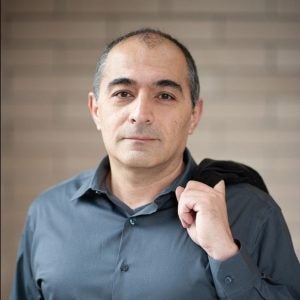
Nader Hashemi joins SFS from the Josef Korbel School of International Studies at the University of Denver, where he was the founding director of the Center for Middle East Studies. Hashemi’s work combines comparative politics and political theory, with particular emphasis on authoritarianism, religion and democracy, secularism, Middle Eastern and Islamic politics, democratic and human rights struggles in non-Western societies and Islam-West relations. In his new role as director of the ACMCU, Hashemi hopes to bring together these research interests and tackle the biggest issues facing the field.
“Our world is facing new global challenges related to climate change, rising inequality and authoritarianism. What do Islamic scholars and ethicists have to say about this new trifecta of overlapping and mutually reinforcing problems that is shaping our contemporary world, the Arab-Islamic world in particular? How are Christian ethicists conceptualizing and confronting these challenges? These are generational, interdisciplinary questions confronting our shared humanity and planet. Developing these new research vistas while continuing existing programs will be a priority for me as the new director of ACMCU,” he says.
In Hashemi’s eyes, the Georgetown community is a strong environment for academics, particularly in the field of Middle Eastern studies.
“I’m awestruck by the intellectual talent that exists at Georgetown. I’m looking forward to working collaboratively with this rich community of scholars and including them into our center’s programming agenda,” Hashemi shares. “Specifically, Georgetown has a pool of talent that work on the politics and societies of the Middle East and the larger Arab-Islamic world. I look forward to engaging specifically with these colleagues and those who work at the intersection of religion, politics and ethics.”
Adam P. Liff
Visiting Chair in Modern and Contemporary Japanese Politics and Foreign Policy
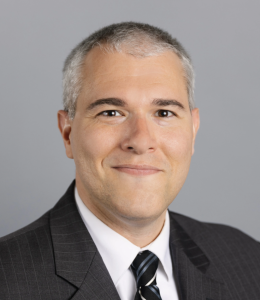
Adam P. Liff, an expert on international security and foreign policy challenges in East Asia, joins SFS on leave from Indiana University’s Hamilton Lugar School of Global and International Studies. At the Hamilton Lugar School, Liff is an associate professor of East Asian international relations and founding director of the 21st Century Japan Politics and Society Initiative. Along with this role, Liff is a nonresident senior fellow at the Brookings Institution’s Center for East Asia Policy Studies, as well as an associate-in-research at Reischauer Institute of Japanese Studies and Fairbank Center for Chinese Studies at Harvard University. Liff’s current research projects examine the course of Japan’s defense policy and the U.S.-Japan alliance, Japan-Taiwan relations and Japan and other major allies’ policies on Taiwan.
In his time at SFS, Liff plans to engage in dialogue with students about Japanese foreign relations through both his courses and special events.
“I’m excited to help launch a new public event series called ‘Japan and the World,’ which will host a series of student-oriented lectures, panels, and conferences exploring various aspects of Japan’s foreign relations and contemporary policy challenges,” Liff says in an interview with The Hoya. “There is no more indispensable ally and partner for the United States than Japan, which plays a hugely important role in almost every major regional and global issue area, from security to trade to global health. I really hope students from across campus—and not just those focusing on Japan—will join us for these public events. Students are not only welcome; this series is designed for them!”
Jonathan Lincoln
Andrew Siegal Visiting Professor
Interim Director, Center for Jewish Civilization
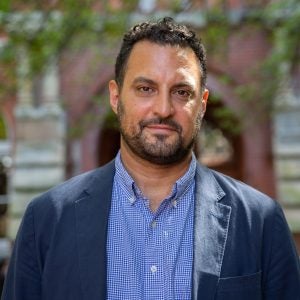
Jonathan Lincoln returns to SFS this fall with a new role as interim director for the Center for Jewish Civilization (CJC), where he has been teaching since spring 2022. Before coming to SFS, Lincoln worked for the United Nations in various roles for almost 15 years. During this time, he served as senior coordination officer for the United Nations Special Coordinator’s Office in
Jerusalem, as senior political affairs officer at the UN’s Department of Political Affairs in New York and as a political affairs officer for the UN Special Envoy for Sudan and South Sudan, based primarily in Juba, South Sudan. Beyond the UN, Lincoln has worked with the Washington Institute for Near East Policy, the Council on Foreign Relations and the International Crisis Group.
These experiences are foundational to Lincoln’s approach to teaching and leading the CJC, and they align with Georgetown’s values more broadly.
“Having worked for most of my career on various aspects of conflict resolution and prevention and engaging in inter-communal and inter-religious dialogue, I see these as core values for the CJC that are also entirely consistent with Georgetown’s mission as embodied in its Jesuit heritage,” Lincoln says.
In his time teaching, Lincoln has admired the strength of the SFS community.
“Admittedly, what I didn’t expect was to feel as connected to the students as I have over the past two years,” he says. “What I am looking forward to most is to work closely with the students and faculty to see how we can uphold and improve the reputation of the CJC as fostering strong and vibrant academic and social engagement within the wider Georgetown community.”
Emily Matson
Assistant Teaching Professor
SFS Asian Studies Program, CAS Department of History
A former Wilson Center China fellow, Emily Matson provides expertise on Northeastern China, historical memory and China during World War II. She received her doctorate from the University of Virginia’s Corcoran Department of History in fall 2020 after writing a dissertation on Chinese World War II museums. Matson has taught courses in modern East Asian history at American University, the College of William and Mary and Randolph College.
Along with her teaching, she is currently a research affiliate at the University of Virginia’s East Asia Center and an education ambassador for the Council on Foreign Relations. She was a Fudan fellow at Shanghai’s Fudan University in fall 2018 and previously lived in Beijing for two years, during which time she studied Mandarin and international relations at Beijing Language and Culture University and Peking University.
“As a historian, I was drawn to SFS because of its legacy in both preceding and inspiring the U.S. Foreign Service,” Matson says. “I’m really looking forward to meaningful conversations about global politics with both my new colleagues and my students, whose fervor for understanding international affairs has already inspired me.”
Kamaludeen Mohamed Nasir
Visiting Professor
Malaysia Chair of Islam in Southeast Asia
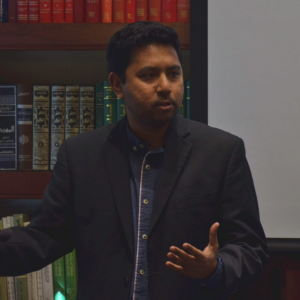
Kamaludeen Mohamed Nasir joins SFS this November, visiting from Nanyang Technological University Singapore. At NTU, Nasir is an associate professor of sociology, and he uses comparative sociology to explore the social realities of Muslims around the world, as well as the intersections of popular culture, piety and state management more broadly.
During his time at NTU, Nasir won the Nanyang Research Award and the Western Sydney University International Alumni of the Year for outstanding contributions to the field.
Nasir’s most recently published book, “Representing Islam: Hip-Hop of the September 11 Generation,” examined how Muslims born after 9/11 use hip-hop as a form of expression in response to rising Islamophobia. The book considers the tensions between Islamic piety and hip-hop and explores how some artists adapt the genre to fit their religious beliefs.
Vanessa Watters Opalo
Assistant Professor
SFS Science, Technology and International Affairs Program; CAS Department of Anthropology
Since 2019, Vanessa Watters Opalo has brought her expertise on the relationship between finance and economic welfare and development projects, particularly in the Global South, to the SFS community. This year, she joins the SFS as an assistant professor. Her current book project focuses on credit-granting institutions and the politics of credit, savings and debt within the cooperative lending movement in Togo, specifically, and the West African region more broadly.
Opalo’s second ongoing research project considers insurance markets in Africa and recent transformations in the kinds of technologies and practices used to build risk profiles and design policies—particularly in the field of crop and livestock insurance.
On her work, Opalo says, “I am an anthropologist who studies the ways that finance, broadly defined, is incorporated into projects of economic welfare and development. Focusing on West Africa, I am particularly interested in how people, financial institutions, and governments make decisions about credibility, trustworthiness and risk, and how technology is increasingly mediating these relationships.”
Since spring 2019, Opalo has used her expertise in courses including Financial Technologies in the Global South and Designing Development: Africa.
“I’ve enjoyed getting to examine issues and topics that I care about with students in the classroom and learning from their unique interests and perspectives,” she says. “I look forward to connecting with faculty and students across the SFS and expanding student opportunities for interdisciplinary studies of finance and technology.”
Jackson Perry
Visiting Assistant Teaching Professor
Center for Contemporary Arab Studies
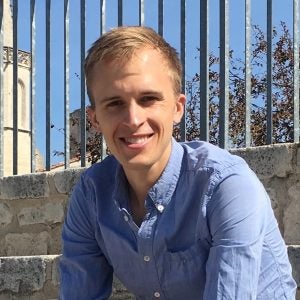
A long-time Hoya, Jackson Perry (Ph.D’21, CAS’12) returns to the Hilltop after working as a postdoctoral research fellow at the New York Botanical Garden and visiting scholar and lecturer at George Washington University. His research focuses on the modern environmental history of the Middle East, North Africa and the Mediterranean region, which he explored in his award-winning 2021 doctoral thesis, “The Gospel of the Gum: Eucalyptus Enthusiasm and the Modern Mediterranean World, c. 1848-1900.”
In his teaching at Georgetown, Perry has examined the evolution of environmental history, beginning with the colonization of the Americas, as well as the impact of globalization on international and intersocietal relations. This semester, he teaches core seminars for graduate students studying in the Arab Studies and MSFS programs.
“I know the high standard that Georgetown students hold themselves to and aspire to in their work. In my teaching, I employ student-led seminars and I prioritize working with primary sources, based in no small part on my experience as a student here,” he says. “I intentionally stepped on the Healy seal as a headstrong freshman, so perhaps the myth of the seal should be amended to ‘you may graduate, but you’ll never leave.’”
Christi Smith
Associate Teaching Professor
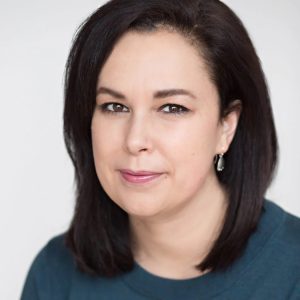
Sociologist Christi Smith arrives at SFS from Washington University in St. Louis. Smith’s research broadly considers how politics and organizations shape processes of social inclusion and exclusion, historically and internationally. She has worked in the department of political science at the University of Aarhus in Denmark and the Mannheim Centre for European Social Research at the University of Mannheim in Germany.
She also regularly co-teaches a service-learning course on refugee incorporation at the University of Konstanz in Germany. Her current research focuses on the ways that cultural understandings of citizenship and belonging shape refugee and migrant inclusion policy and practice across democratic states, informed by her experience growing up in Germany and working in refugee services in Denmark.
“I am enjoying getting to know both colleagues and students. Every week there are too many intriguing events I want to find time to attend,” Smith says. “It is exciting to be here as the Institute for the Study of International Migration launches the new Master of Arts in International Migration and Refugees. Beth Ferris and Katharine Donato have great connections in the field and the work they have done to connect program design with the needs of employers makes it a unique program.”
Titilola Halimat Somotan
Assistant Professor
African Studies Program
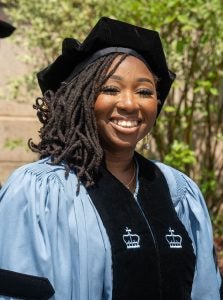
Titilola Halimat Somotan is a historian of twentieth-century Africa with research interests in the history of decolonization, postcolonial rule, urban history and women’s history. Somotan comes to SFS from Auburn University, where she was an assistant professor of history and taught world history and African history courses. She received her Ph.D. in history from Columbia University. Her book manuscript, based on her dissertation, investigates how female traders, landlords and renters debated and reimagined policies concerning urban renewal, rent inflation and municipal infrastructure.
The manuscript considers the period from the 1940s to the 1970s, when British planners, in collaboration with the Nigerian government, imposed a modernist plan on Lagos. The book employs oral interviews and archival evidence to show how the voices and political activism of ordinary urban dwellers shaped the transformation of one of the most populous cities in Africa.
In her undergraduate experience at Fairfield University, her undergraduate fellowship at the Schomburg Center for Research in Black Culture and her pre-doctoral fellowship at the University of Virginia’s Carter G. Woodson Institute for African American and African Studies, Somotan has employed an interdisciplinary approach that primed her for her time at SFS.
“My experiences in these programs have inspired me to position myself in spaces like SFS where I can be in conversation with a community of scholars who are engaging with exciting questions about global topics,” Somotan says. “I’m excited to get to know SFS’s students’ research interests as well as integrate museum exhibitions on African studies in DC into classroom discussions and assignments.”
Yuri Zhukov
Visiting Associate Professor
SFS and CAS Department of Government
Arriving to SFS later this year, Yuri Zhukov (SSP’07) is a political scientist who studies armed conflict and repression using spatial statistics, mathematical and computational modeling and text analysis. Along with his new role at Georgetown, Zhukov is a visiting associate professor of public policy at Harvard Kennedy School and an adjunct research associate professor at University of Michigan’s Center for Political Studies.
Zhukov received his Ph.D. from the department of government at Harvard University, where his dissertation “A Theory of Indiscriminate Violence” won the Edward M. Chase Prize for best dissertation in international relations. Zhukov is also a Georgetown alumnus, having received his master’s in security studies at Georgetown’s Center for Security Studies.



